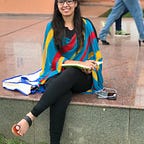A Book Review
“The Free Voice” by Ravish Kumar
An exploration of country values and pure journalism
Mirror Mirror on the Wall, Where’s Democracy After all?
A few days ago, Rahul Bajaj expressed his concern over how the incumbent government is creating an atmosphere of fear in the country, and in just two hours, people on Twitter started targeting the industrialist over his remark, some saying that he is biased in his political leanings.
India is currently witnessing a nationwide protest regarding a certain act, and the youth of the country have come to the streets as an act of resistance and agitation.
Mr. Bajaj is not the only one who feels this way, nor are the students. Considered one of the finest and bravest journalists in India today, Ravish Kumar writes in The Free Voice about similar issues that are prevalent in the country today.
About the Author
Ravish Kumar is a senior executive editor of NDTV India and one of the most influential Hindi journalists. He was recently awarded the Magsaysay Award, and is famous for his monologues on NDTV India. He is said to be a journalist that raises issues that actually bother the nation, and the majority of its population. He holds the establishment to account.
Ravish Kumar starts off this book by talking about Justice Loya’s case and going forward listing the insecurities and threats that a journalist has to face in order to report a truthful story. The instances he mentions are not very far away from the reality of the mainstream media. I have tried to understand the mainstream media recently by watching a lot of prime-time debates on burning issues, and by subscribing to Kumar’s account.
Ravish Kumar goes on to explain how this National Project of Instilling Fear is executed so well that everyone is scared to speak against the government, and the media is only adding fuel to the fire. I remember the editor of the Indian Express talking about how good journalism isn’t dying, but it’s the bad journalism that makes more noise.
One section of the book that I particularly liked is how he compares George Orwell’s book 1984 to what is happening in the country today. The comparisons are uncanny and absolutely relatable for someone who knows the current political scenario. I hadn’t read the book 1984 before this, and the way Ravish Kumar described it, I bought the book and read it. The way he talks about the book and the current scenario, one can say that Orwell was far-sighted and a visionary.
Overall, The Free Voice is worth reading for almost every Indian. It consolidates all of the experiences of the journalist, as well as the situation of the current mainstream media.
Recommended: 8.5/10
Favorite Quotes:
“Whenever others raise their voice, encourage them. Even if you do not always agree with their endeavour, support them to the extent that they are able to speak and others are able to hear them out.” If democracy is the will of the majority, is not mob a majority? When you speak, you must first challenge yourself. You first become your own interrogator before asking questions of others. India is a country where people depend predominantly on astrology — just as the economy depends predominantly on agriculture.
To purchase this book, click here.
Originally published at http://tanishavenkani.wordpress.com on December 20, 2019.
